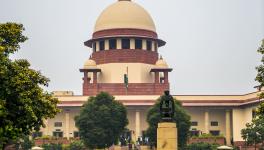Petition Demands Marketing Code for Pharmaceutical Companies, SC Asks Govt to Respond
Representational use only.
Justice DY Chandrachud and Justice Surya Kant of Supreme Court on Friday, March 11, ordered the Union Ministry of Law, the Union Ministry of Chemicals and Fertilisers, and Union Ministry of Health and Family Welfare to respond to a petition demanding formulation of a statutory marketing code for promotion of medicines.
The petition has been filed by the Federation of Medical and Sales Representatives’ Association of India (FMRAI) and Amitava Guha, National Coordinator of Jan Swasthya Abhiyan (JSA), praying for enforcement of legal code for marketing of medicines. The petitioners are being represented by senior advocate Sanjay Parikh.
Speaking to NewsClick, Amitava Guha explained, “The pharmaceutical companies spend a large amount of money on marketing, which is a highly unethical practice. On one hand, it leads to an increase in prices of the medicines, and on the other hand, these advertisements influence ordinary people to buy and consume medicines that they do not have any need for.”
“In India, pharmaceutical companies spend enormous amounts of money in sales promotion to influence doctors to generate maximum prescriptions thereby increasing drug-sales,” Guha said in a press statement released on March 11. He added that a study had found that the top seven pharma companies together had spent Rs 34,186.95 crore on marketing in eight years, making drugs expensive.
The statement noted that sales promotion expenses constitute 20% of the cost of drugs, making them less and less affordable for the ordinary people. It said, “Though termed ‘sales promotion,’ these are in fact direct or indirect advantages offered to doctors (as gifts and entertainment, sponsored foreign trips, hospitality and other benefits)in exchange for increase in drug-sales.”
FMRAI has been leading a long struggle to make the government regulate the amount of money that can be spent by pharmaceutical companies on advertising, but to no avail. Guha said, “Under the increasing pressure from FMRAI, several meetings have been held between our representatives, the Union ministries, and owners of pharmaceutical companies. It was decided that the Union government would draft a marketing code, but that never happened.”
That history of legislation governing drugs primarily began in India with the Drugs and Cosmetics Act, which was formulated in 1940, following the recommendations of the Chopra Committee constituted in 1930 by the Government of India. The Drugs Act was formulated to ensure that the drugs and cosmetics sold in India are safe, effective and conform to prescribed quality standards. Subsequently, various laws, regulations and guidelines were passed to regulate the manufacturing, sale and distribution of drugs and medicines.
Direct-to-consumer advertisement of drugs and medical devices came to be regulated by various laws including provisions of the earlier Drugs & Cosmetics Act, 1940, the Drugs & Cosmetics Rules, 1945, the Drugs and Magic Remedies (Objectionable Advertisement) Act, 1954, the Consumer Protection Act, 1986, and the Advertising Standards Council of India’s Code for Self-Regulation in Advertising. However, the petition pointed out, these regulations did not cover promotional activities carried on by pharmaceutical companies in relation to healthcare professionals.
In 1956, the Indian Medical Council Act came into being. The Medical Council of India framed regulations relating to the professional conduct, etiquette and ethics for registered medical practitioners, which covered the relationship between healthcare professionals and pharmaceutical companies. These regulations prohibited acceptance of gifts and entertainment from pharmaceutical companies by medical practitioners. The Medical Council of India Act, 1956 has been replaced by the National Medical Commission Act, 2019 which came into force on September 25, 2020, however, the provisions of the previous Act and rules made thereunder will continue to be in force and operate until new standards are specified or new rules are notified.
The Code of Ethics released by the Indian Council of Medical Research (ICMR) in 2002 reiterated the rules and regulations, and laid down punishments which may be a result of professional misconduct, which included suspension of the licence of a doctor and civil penalties. However, the petitioners pointed out, the IMCR, 2002 did not apply to pharmaceutical companies. As a result, the petition highlighted, no enforceable law, rules or regulations have been brought into existence which cast a corresponding obligation upon pharmaceutical companies to refrain from unethical marketing practices and regulate the promotion of drugs and medical devices to healthcare professionals by pharmaceutical companies.
The petition cited a study done by the Citizen Consumer and Civic Action Group (CAG) in 2018, which highlighted the deep-rooted corruption in the Indian pharmaceutical industry and the well-organised and highly methodical nexus between drug companies, pharmacists and doctors, and medical representatives that led to many unethical drug promotion practices. The study, titled Commitment of Indian Pharmaceutical Companies Today to Their Primary Calling of Curing Diseases, said, “Indian pharmaceutical companies are becoming unduly profit-centred in the not-for-profit mission of developing vital medical cures and distributing life-saving medicines for all. There had been exposés of deep-rooted corruption in the Indian pharmaceutical industry.”
It added, “It was seen from this study (Drug promotional practices in Mumbai: a qualitative study”) that the nexus between drug companies, pharmacists and doctors, and medical representatives that led to many unethical drug promotion practices was well-organised and highly methodical.”
The statement released by Guha said, “There are abundant examples that show how corruption in the pharmaceutical sector endangers positive health outcomes and puts patients’ health at risk. As violations of this kind have become a recurring phenomenon and are progressively becoming more pervasive, the Petitioners pray that a Statutory Code of ethical marketing for the pharmaceutical industry, with penal consequences, be established to curb such practices for the enforcement of the fundamental Right to Health of the people of India. Due to the voluntary nature of the existing Code, unethical practices continue to increase and have also surfaced during the COVID-19 times.”
Get the latest reports & analysis with people's perspective on Protests, movements & deep analytical videos, discussions of the current affairs in your Telegram app. Subscribe to NewsClick's Telegram channel & get Real-Time updates on stories, as they get published on our website.
























